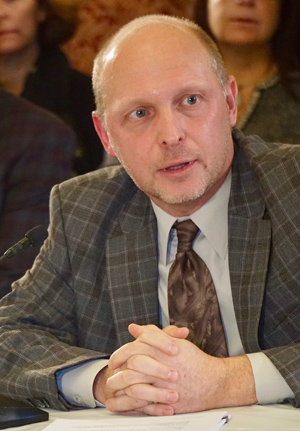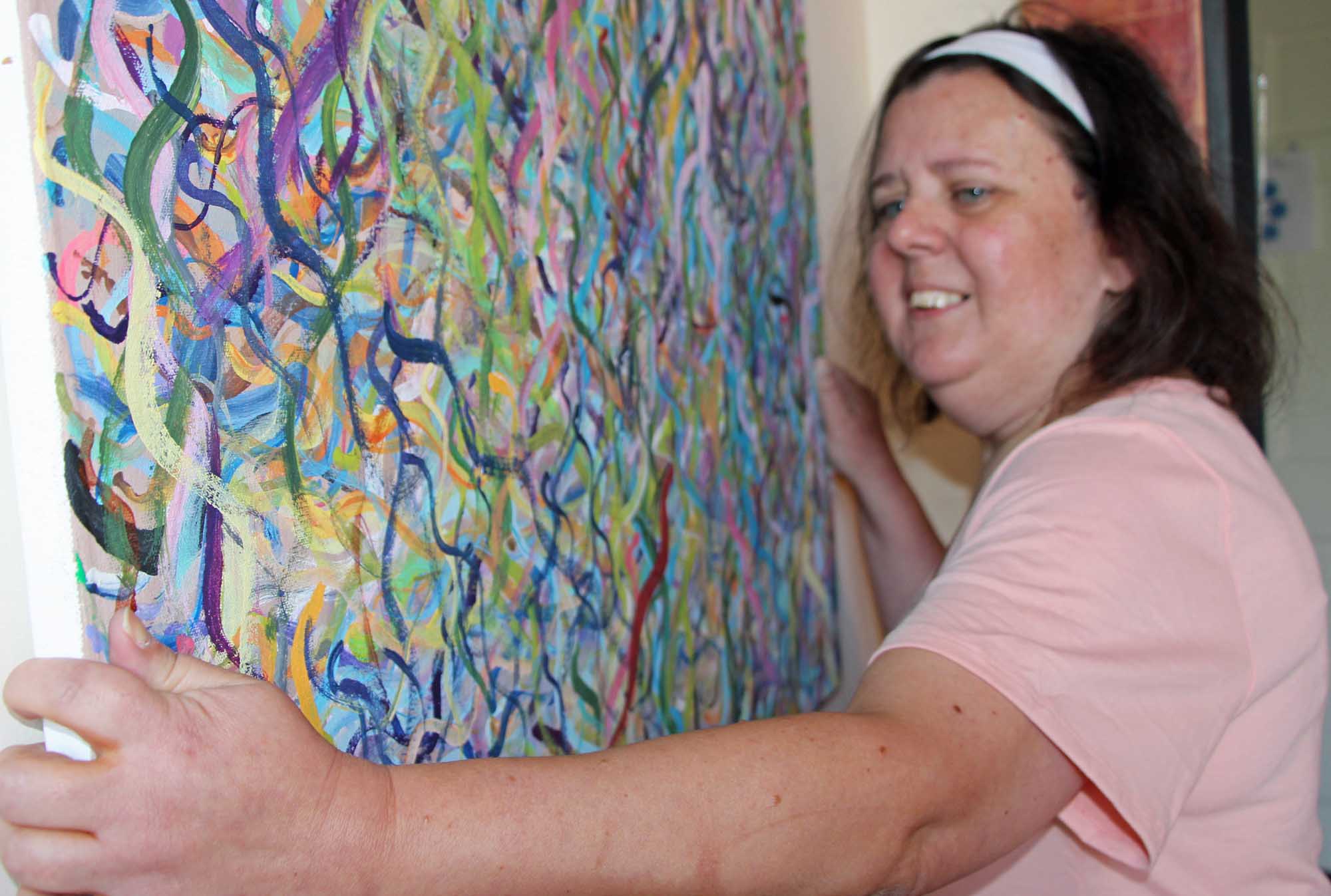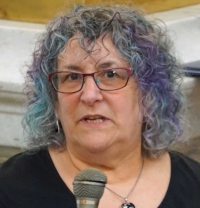Advocates: RI Must Put Higher Value On DD Workforce To Ensure Stability In Client Services
/Image courtesy of RI Capitol TV
By Gina Macris
The incremental pay increase that Rhode Island Governor Gina Raimondo proposes for those who care for adults with developmental disabilities- about 34 to 41 cents an hour - is “much appreciated,” Tom Kane, CEO of AccessPoint RI, told the House Finance Committee recently.
But “it’s not enough,” Kane added quickly.
Entry-level workers making an average of $11.44 an hour, or more experienced colleagues paid an average of $12.50 an hour, are “often helping a person eat, shower, use the bathroom, or they could be helping someone learn how to drive their car,” Kane said.
“It is a completely and utterly important job, but based on the funding available, it is not really valued by our state,” Kane continued.
“ I’ve said this in this room a number of times. A budget is a statement of values, and what we’re saying is that this work isn’t worth enough money to make a living.”
To illustrate his point, Kane told Finance Committee members that he searched for jobs on the website Indeed.com to prepare for his testimony March 13 and found a posting from a kennel seeking someone to clean cages for $14 an hour.
“Not that I would disparage any job that anyone would have,” Kane said. “I think there should be dignity in all work. I think as a society we have to say, for those who care and support the people to live in the community, to try to have the best life possible, we need to fund the agencies to pay a reasonable rate.”
Kane spoke from the perspective of some three dozen private service providers in Rhode Island, the core of the state’s developmental disability service system. These agencies are trying to make ends meet while dealing with high job turnover and high vacancy rates, as well as the costly overtime it requires to ensure the safety of the vulnerable people in their care.
In the context of the state’s fee-for-service Medicaid reimbursement system, now in its eighth year, the concerns of the providers converge with those of a 2014 federal consent decree which spells out the civil rights of people who, through an accident of birth, spend a lifetime trying each day to rise to the challenge of diverse disabilities.
And in the past year, there has been growing pressure for change, both from those overseeing the implementation of the consent decree and from an expanding chorus of advocates.
In a “Week of Action” planned by the Community Provider Network of Rhode Island (CPNRI) March 26 through 28, providers and their supporters, including consumers and their families, will fan out under the State House rotunda to buttonhole individual legislators in the hours before the bell sounds shrilly at 4 p.m. calling the House and Senate to order.
In the fiscal year beginning July 1, Raimondo has proposed a $6.4 million budget increase targeted for pay raises, including $3 million in state revenue and $3.4 million in federal Medicaid funds. This sum would raise the wages of direct support workers by what state officials estimate as 43 cents an hour.
But the leaders of CPNRI and the Provider Council, another trade association, say that to stabilize the private system of developmental disability services, providers need about $28.5 million in state revenue, which would generate a roughly equal amount in federal Medicaid payments.
“We recognize that this is a substantial amount of money, but it is a result of chronic underfunding,” said Donna Martin and Peter Quattromani in a letter to Raimondo dated Jan. 9. Until March, Martin was executive director of CPNRI. Quattromani, executive director of United Cerebral Palsy of Rhode Island, represented the Provider Council.
Their reference to “chronic underfunding” alludes to “Project Sustainability,” the fee-for service funding model enacted by the General Assembly in 2011 with a $26-million budget cut. Project Sustainability was cited by the U.S. Department of Justice in 2014 as contributing to a segregated system of services that violated the integration mandate of the Americans With Disabilities Act.
With the closing of the Ladd School in 1994, Rhode Island was once first in the nation in de-institutionalizing adults with developmental disabilities and its efforts to include former residents in everyday life in the community. Today, 25 years after the Ladd School was shuttered, Rhode Island is ranked 32nd among the states in its inclusion efforts by CPNRI’s national affiliate, the American Network of Community Options and Resources.
Project Sustainability is currently the subject of two separate reviews, one by a special legislative commission and another by the Department of Behavioral Healthcare, Developmental Disabilities and Hospitals (BHDDH), which has hired a consultant to scrutinize both the reimbursement rates and the fee-for-service model itself.
Between 2011 and 2012, Project Sustainability exacerbated a downward trend in funding for developmental disabilities that eventually leveled off but has not caught up with the pace of inflation, despite budget increases in recent years, according to a ten-year analysis done by CPNRI. The study used state budget figures and consumer price index information kept by the state Department of Labor and Training.
Chart Courtesy of CPNRI
Low wages have put Rhode Island service providers at a disadvantage in trying to recruit a variety of personal care workers like those who work with adults with developmental disabilities, experts say.
CPNRI reports that about one in three workers leave a developmental disability job every year, mostly, they say, because they can’t pay their bills. One in five positions remain vacant, driving up the cost of overtime necessary to ensure the safety of the vulnerable people in care, according to the trade association.
PHI National, long-term care consultants, have produced a chart comparing the earnings of personal care workers in Rhode Island, Connecticut and Massachusetts that shows Rhode Island with the lowest wages and the least buying power relative to the minimum wage.
chart courtesty of PHI and CPNRI
Policy experts say that basic demographic data for the nation indicates a shortage of personal care workers in the next few decades. That was one of the key messages delivered by Mary Lee Faye, executive director of the National Association of State Directors of Developmental Disabilities Services, to the Project Sustainability study commission in January.
Meanwhile, the House Fiscal Office estimates that the governor’s proposed raise for front-line developmental disability workers would add add 41 cents to their average hourly wage, lifting it from $12.27 an hour to $12.68 an hour. The overall $6.4 million pay hike doesn’t include raises for supervisors or job development and support coordinators, the House Fiscal Advisor, Sharon Reynolds Ferland, has told the House Finance Committee.
Providers say the state’s estimates don’t match up with actual costs. The state funds 35 percent of overhead related to employment, including mandatory costs like health and dental insurance, workers compensation insurance, payroll taxes, paid time off and other items, according to a CPNRI policy paper.
In reality, providers say, these employee-related expenses cost 64 percent[1] of wages – a point CPNRI’s Martin and the Provider Council’s Quattromani made in their Jan. 9 letter to Raimondo.
Providers fill the gap between the available state and federal Medicaid funding and the actual costs of employee-related overhead by reducing the amount of the wage increase passed along to workers. Kane, in his testimony, said that for the lowest-paid direct care workers, Raimondo’s planned pay increase will not even cover the cost of a separate proposal she has made to increase the state’s minimum wage for all workers from $10.50 to $11.10.
In the last few years, individuals with developmental disabilities, their families, and providers have gained legislative advocates, most prominently Sen. Louis DiPalma, D-Middletown, who is the first vice-president of the Senate Finance Committee.
DiPalma, as chairman of the special legislative commission studying Project Sustainability, convinced a consultant involved in developing that fee-for-service model to return to Rhode Island and testify about his work last November.
Mark Podrazik, a principal in the Arizona-based Burns & Associates, made it clear that Project Sustainability was shaped in a frantic effort to control costs.
Mark Podrazik * Photo By Anne Peters
The firm ultimately was paid a total of $1.4 million to develop Project Sustainability and monitor how it affected spending for developmental disabilities services. (The funding model contains no provisions for measuring the impact of services on individuals.)
Podrazik testified that some of Burn’s key recommendations were ignored, including a proposed base pay of $13.97 an hour for direct care workers that would increase within a year or two to $15 an hour. That was in 2011.
Today, eight years later, advocates are still chasing that $15-hour wage. About a month ago, DiPalma and Rep. Evan Shanley, D-Warwick, introduced companion bills to raise direct care workers’ pay to $15 an hour by July 1, 2020. The chairman of the Senate Finance Committee, William D. Conley, was among the co-sponsors of DiPalma’s bill.
More recently, DiPalma introduced a second bill that would require all private human service agencies under contract with the state to pay their employees at least 44 percent above the minimum wage at any given time. Both Conley and Senate President Dominick Ruggerio have signed on to this bill as co-sponsors.
A year ago at this time, Raimondo had proposed an $18.4 million cut in developmental disability services for reasons that were never spelled out in public. Raimondo rejected warnings of(BHDDH) that the move would result in waiting lists for services or cuts in programming.
The proposed cut appeared to be unacceptable to an independent court monitor who continues to oversee implementation of the 2014 consent decree. The agreement calls for integrated, community-based services that are inherently more costly than the facility-based system embedded in Project Sustainability.
In May, 2018, the monitor, Charles Moseley, obtained written assurances from Raimondo that she would continue to support the work of the consent decree, which in the moment meant restoring the almost all the $18-million cut.
In the courtroom, the judge who periodically oversees the status of the consent decree, John j. McConnell, Jr. of U.S. District Court, has indicated his willingness to issue orders to ensure that specific goals of the consent decree are met. At the same time, he said he couldn’t order the state to spend a certain amount to achieve them.
Meanwhile, Moseley has continued to keep abreast of budget developments. In February he wrote McConnell, saying Raimondo’s proposed budget “appears adequate” to cover a deficit in the current fiscal year and fund the consent decree in the budget beginning July 1.
Without mentioning how the Governor may have calculated developmental disability budgets in the past, Moseley made a point of saying he has received assurances that the latest figures are based on real-time data about the projected use of developmental disability services.
The state’s lawyer, Marc DeSisto, has assured him that “the Governor’s recommended budget accepts the most up-to-date projections for financing the current costs of the system to ensure no changes for individuals with DD and continued commitment to achieving Consent Decree outcomes,” Moseley wrote the judge.
Moseley put the current working budget for the private system of developmental disability services at about $229.4 million. Raimondo’s proposal adds about $4 million to finish the current fiscal year, for a total of $233.4 million. Moseley said the increase includes:
· $1 million for the estimated growth in the number of people receiving services
· $1.3 million for increased costs of providing services
· $645,000 to compensate for unrealized savings in moving group home residents into less costly residential options
· $500,000 in other priorities.
In the fiscal year beginning July 1, Moseley said, Raimondo would add about $7.3 million to the private developmental disability system, for a total of $240.2 million. That figure includes:
$516,000 for continued growth in the number of people receiving services
$2.7 million for increased costs in providing services.
$6.4 million for the wage increase to direct care staff.
Those totals are offset by about $1.3 million in increased expectations for savings in residential costs and another million in savings from a reform initiative that didn’t start on time.
Moseley said all his figures were rounded off.
Deep in the background, BHDDH is quietly gearing up for a top-to-bottom analysis of Project Sustainability itself – a move applauded by DiPalma, providers, families and consumers. The lack of flexibility in services provided by Project Sustainability also has drawn the criticism of the court monitor.
Providers have said the funding formula does not allow them to plan on services for longer than three months at a time and makes it difficult for them to base their services in the community.
For example, Project Sustainability assigns staffing ratios according to the degree to which a person may be unable to do basic things independently, but doesn’t take into account the resources that person might need to get to a job – or hockey game – in the community.
Project Sustainability originally made it difficult for individuals to hold jobs in the community by providing work-related services only at the expense of other kinds of daytime supports.
In 2017, to comply with the work goals of the consent decree, BHDDH launched an add-on program of performance payments for providers for placing clients in community-based employment and for meeting job-retention goals.
DiPalma has said it is imperative that BHDDH finish a new rate model for private developmental disability services in time for Raimondo to introduce her budget to the General Assembly next January.
To satisfy the consent decree, the new design would have to focus on helping individuals lead regular lives in the community. Such a model would inevitably demand a greater financial commitment from the state and pose a new test of lawmakers’ values.


























